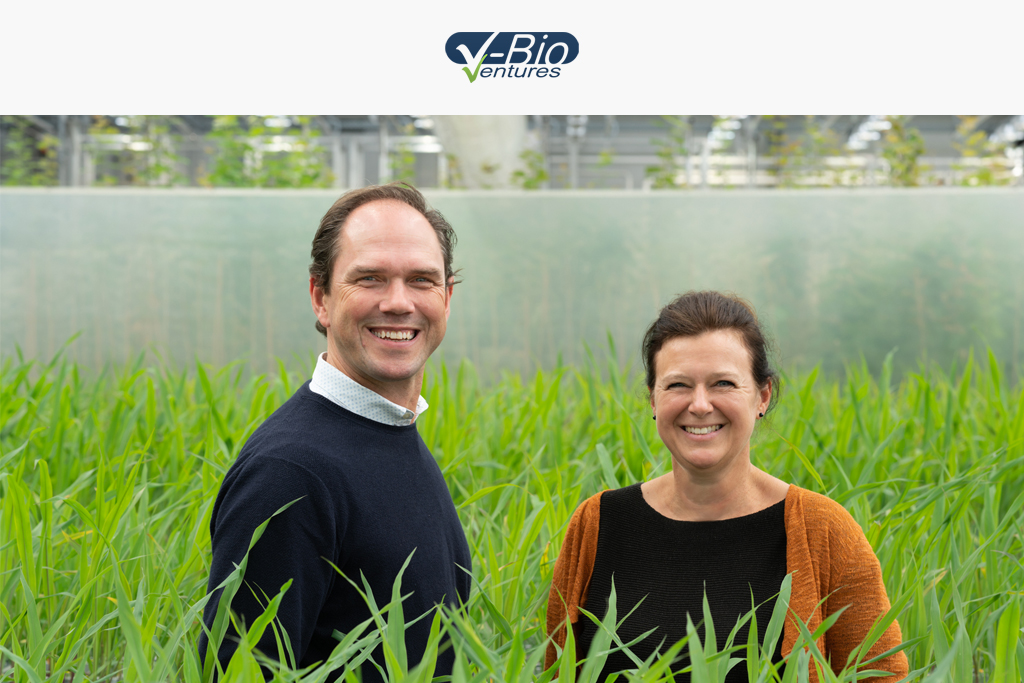In this month’s article we take a look at Aphea.Bio, a V-Bio Ventures portfolio company. This startup is developing microbiome products for improved crop growth and pest protection, using state-of-the art technology.
By Amy LeBlanc. Header image: Dr. Steven Vandenabeele (CSO) and Dr. Isabel Vercauteren (CEO), courtesy of Aphea.Bio.
The microbiome has been a hot topic in the life sciences for the past few years. Usually, the headlines focus on human gut bacteria, but did you know that plants have a microbiome too? Enterprising companies are tapping into these pre-existing relationships between microbes and plants to come up with new sustainable solutions for agriculture.
At the forefront of this effort we find Aphea.Bio. Based in the Zwijnaarde Science Park near Ghent, Belgium, the company operates a smart R&D platform. In their lush laboratories, the Aphea.Bio team are searching for soil microbes that are beneficial to crops.
“We are convinced that there is potential in the ground… Our mission is to provide farmers with innovative and sustainable solutions to reduce fertilizer and pesticide use.” – Isabel Vercauteren, Aphea.Bio
The team is looking for strains or consortia that can help plants defend themselves from pests (bioprotectants) and those that can help promote plant growth through improved nutrient uptake (biostimulants). For now, the main focus is on wheat and maize.
The company is led by Dr. Isabel Vercauteren (CEO) and Dr. Steven Vandenabeele (CSO). According to Vercauteren, Aphea.Bio’s main goal is clear:
“We are convinced that there is potential in the ground. We know that certain microorganisms can stimulate growth or fight pests. Our mission is to provide farmers with innovative and sustainable solutions to reduce fertilizer and pesticide use.”
Dirty discoveries
Named after a Greek goddess of agriculture, Aphea.Bio was founded in 2017 as a spin-off of the VIB, Ghent University and KU Leuven. The company has raised about USD 10 million in funding so far, with V-Bio Ventures as one of the main investors.
The research is supported by both academic partnerships, including Prof. Sofie Goormachtig’s plant biology lab (VIB-Ghent University) and Prof. Jeroen Raes’ microbiome group (VIB-KU Leuven). The company also has an R&D partnership with global fertilizer company EuroChem.
“We invest a lot of our effort and resources into state-of-the-art technology, innovation and automation. We are always thinking: can we do this quicker, better, or more efficiently?” – Isabel Vercauteren, Aphea.Bio
Aphea.Bio’s CSO, Vandenabeele, explained their R&D process:
“The first step is gaining insight into the very complex microbiome of soils and plants. There are thousands of different species of microorganisms in the soil that potentially interact with plants. We grow our target crops, wheat and maize, in soils that each contain a different microbiome and identify the microbial strains that have a beneficial effect using metagenomics.
Once we have these candidate strains, we test them in our greenhouse or our growth chambers and we monitor these in a high-throughput way based on the phenotypic characteristics such as the plant growth speed, greenness and biomass or reduced disease development.”
This discovery process is made possible through a state-of-the-art greenhouse, which includes an automated phenotyping platform. Using a flying camera that produces 3D images of the plant biomass, the growth and health of every plant in the 600 square meter greenhouse can be measured in just a single day. Speaking of this automation, Vercauteren commented:
“We are a smaller company, still a startup, but we invest a lot of our effort and resources into state-of-the-art technology, innovation and automation. We are always thinking: can we do this quicker, better, or more efficiently?”
Navigating half-formed regulations
Enabled by smart tech, the company’s high-throughput approach and broad pipeline discriminates it from other companies in the same space. The Aphea.Bio’s proprietary strain culturing methods allows them to culture unique strains that have never before been isolated. This means there is a high degree of novelty and diversity in the strains that are isolated, which are patented either as individual strains or as consortia.
“We’re striving for results that equal those of current chemical fertilizers and pesticides. If our products prove to be as efficient as the chemicals, they can be used as stand-alone products”. – Steven Vandenabeele, Aphea.Bio
Asked about the regulatory challenges associated with developing a “living product”, Vandenabeele replied:
“There are different routes through regulation depending on the region where you want to market your product. In the US, there are specific biopesticides regulations which clearly define the path for bioprotectant microbials. In Europe, they’re currently reviewing the regulatory process for these types of products. For biostimulants, things are still unclear in both the US and the EU. There is work to be done on both continents, but the regulations do seem to be crystallizing.”
Growing funds for sustainable products
Aphea.Bio started field tests for their first candidate products earlier this year. Though the data are still under further analysis, Vandenabeele stated that they have seen significant effects:
“We’re striving for results that equal those of current chemical fertilizers and pesticides. If our products prove to be as efficient as the chemicals, they can be used as stand-alone products. Alternatively, they could form a part of an integrated pest control or fertilizer program.
We are now in the field validation step and working hard on our formulations. We still need a number of repeated field seasons, but we’re aiming for first product on the market in the next few years.”
For more on sustainable agriculture, read this previous article about Inari, an innovative seed company.
To support this shift towards product development, Aphea.Bio are currently fundraising, looking to close the new round early next year. The funds will be used expand the company’s portfolio and product development.
The Aphea.Bio credo “Applied Nature for better Agriculture” perfectly encapsulates the growing move towards innovation and creative solutions for a more sustainable global food system.


